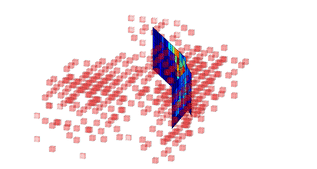Earthquake prediction
Earthquakes are complex natural phenomena that can have significant impacts on human lives and the environment. Despite advances in earthquake monitoring and early warning systems, the ability to predict earthquakes[1] with accuracy and precision remains a major challenge for the scientific community.
Traditionally, earthquake prediction[1] has relied on the analysis of various geophysical and geochemical indicators, such as changes in ground deformation, fluid levels, and seismic activity[3]. While these methods have provided some useful insights into the behavior of earthquakes, they have limitations in terms of accuracy and reliability.

Fig. 1 - Forecasting earthquake aftershock locations with AI-assisted science [P. R. DeVries, 2018]
In recent years, artificial intelligence (AI) methods[3][4][5][6] have been increasingly used in the field of earthquake prediction. AI algorithms[4][5], such as machine learning and deep learning[3][4], can process large amounts of data and identify patterns and relationships (see Fig. 1) that may not be apparent to human analysts[5]. This makes AI a promising tool[5] for improving our understanding of earthquakes and developing more accurate prediction models[2].
One common AI approach to earthquake prediction involves the use of machine learning algorithms to analyze patterns in seismic data[4][5]. These algorithms can identify changes in seismic activity that may indicate the likelihood of an impending earthquake. By incorporating information about past earthquakes and geological conditions, machine learning models can provide more accurate and reliable predictions of future earthquakes[2].
Another promising area of AI research[2] in earthquake prediction involves the use of deep learning algorithms[4] to analyze satellite imagery and other remote sensing data. These algorithms can identify changes in ground deformation, land use, and vegetation patterns that may be associated with increased seismic activity[6]. By combining this information with seismic data and other geophysical indicators, deep learning algorithms[4] can provide a more comprehensive and nuanced understanding of earthquakes and their underlying causes.
It is important to note that the use of AI in earthquake prediction[3] is still in its early stages and much work remains to be done to fully understand and utilize its potential. There are also important ethical and practical considerations to be addressed, such as the potential for false alarms and the impact of earthquake predictions on communities and the economy.
In conclusion, the use of AI methods[5] in earthquake prediction holds great promise for improving our ability to understand and predict earthquakes[2]. By incorporating data from multiple sources and using advanced algorithms to analyze this data, AI can help us better understand the underlying causes of earthquakes and develop more accurate and reliable prediction models[3][4][5][6].
References
- Johnson, P. A., Rouet-Leduc, B., Pyrak-Nolte, L. J., Beroza, G. C., Marone, C. J., Hulbert, C., et al. (2021). Laboratory earthquake forecasting: A machine learning competition. Proceedings of the National Academy of Sciences, 118(5), e2011362118. https://doi.org/10.1073/pnas.2011362118
- Tehseen, R.; Farooq, M.S.; Abid, A. Earthquake Prediction Using Expert Systems: A Systematic Mapping Study. Sustainability 2020, 12, 2420. https://doi.org/10.3390/su12062420
- Mohsen Yousefzadeh, Seyyed Ahmad Hosseini, Mahdi Farnaghi, Spatiotemporally explicit earthquake prediction using deep neural network, Soil Dynamics and Earthquake Engineering, Volume 144, 2021, 106663, ISSN 0267-7261, https://doi.org/10.1016/j.soildyn.2021.106663.
- R. Li, X. Lu, S. Li, H. Yang, J. Qiu and L. Zhang, "DLEP: A Deep Learning Model for Earthquake Prediction," 2020 International Joint Conference on Neural Networks (IJCNN), Glasgow, UK, 2020, pp. 1-8, doi: 10.1109/IJCNN48605.2020.9207621.
- M. H. A. Banna et al., "Application of Artificial Intelligence in Predicting Earthquakes: State-of-the-Art and Future Challenges," in IEEE Access, vol. 8, pp. 192880-192923, 2020, doi: 10.1109/ACCESS.2020.3029859.
- Bao, Z.; Zhao, J.; Huang, P.; Yong, S.; Wang, X. A Deep Learning-Based Electromagnetic Signal for Earthquake Magnitude Prediction. Sensors 2021, 21, 4434. https://doi.org/10.3390/s21134434